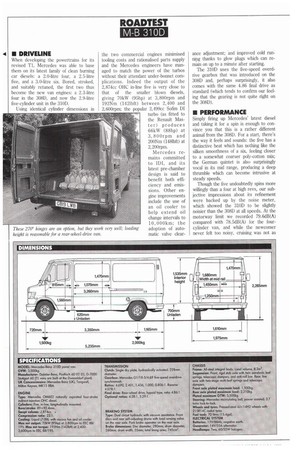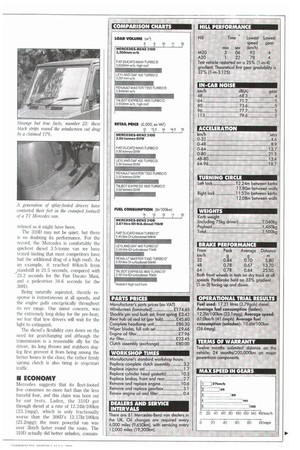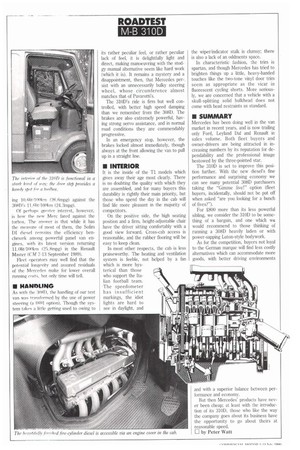ROADTEST M-B 310D
Page 38

Page 39

Page 40

If you've noticed an error in this article please click here to report it so we can fix it.
• DRIVELINE
When developing the powertrains for its revised Ti, Mercedes was able to base them on its latest family of clean burning car diesels: a 2.0-litre four, a 2.5-litre five, and a 3.0-litre six. Bored, stroked, and suitably retuned, the first two thus become the new van engines: a 2.3-litre four in the 3081), and now the 2.9-litre five-cylinder unit in the 310D.
Using identical cylinder dimensions in the two commercial engines minimised tooling costs and rationalised parts supply and the Mercedes engineers have managed to match the power of the turbos without their attendant under-bonnet complications. Indeed the output of the 2,874cc OHC in-line five is very close to that of the smaller blown diesels, giving 70kW (95hp) at 3,800rpm and 192Nm (142lbft) between 2,400 and 2,600rpm; the popular 2,499cc Sofim DI turbo (as fitted to the Renault Mast e r) produces 66kW (88hp) at 3,8 0Orpm and 200Nm (148Ibft) at 2,20Orpm.
Mercedes remains committed to IDI, and its latest pre-chamber design is said to benefit both efficiency and emissions. Other engine improvements include the use of an oil cooler to help extend oil change intervals to 1 0,0 0 Okm; the adoption of automatic valve clear
ance adjustment; and improved cold running thanks to glow plugs which can remain on up to a minute after starting.
The 310D uses the five-speed overdrive gearbox that was introduced on the 308D and, perhaps surprisingly, it also comes with the same 4.86 final drive as standard (which tends to confirm our feeling that the gearing is not quite right on the 308D).
• PERFORMANCE
Simply firing up Mercedes' latest diesel and taking it for a spin is enough to convince you that this is a rather different animal from the 308D. For a start, there's the way it feels and sounds: the five has a distinctive beat which has nothing like the silken smoothness of a six, feeling closer to a somewhat coarser poly-cotton mix; the German quintet is also surprisingly vocal in its mid range, producing a deep thnimble which can become intrusive at steady speeds.
Though the five undoubtedly spins more willingly than a four at high revs, our subjective impressions about its refinement were backed up by the noise meter, which showed the 310D to be slightly noisier than the 3081) at all speeds. At the motorway limit we recorded 79.6dB(A) compared with 78.5d13(A) for the fourcylinder van, and while the newcomer never felt too noisy, cruising was not as relaxed as it might have been.
The 310D may not be quiet, but there is no doubting its performance. For the record, the Mercedes is comfortably the quickest diesel 3.5-tonne van we have tested (noting that most competitors have had the additional drag of a high roof). As an example, it reached 80km/h from ,standstill in 21.5 seconds, compared with .23.2 seconds for the Fiat Ducat° Maxi, and a pedestrian 39.6 seconds for the 308D.
Being naturally aspirated, throttle response is instantaneous at all speeds, and the engine pulls energetically throughout its rev range. One minor concern, was the extremely long delay for the pre-heat; we fear that few drivers will wait for the light to extinguish.
The diesel's flexibility cuts down on the need for gearchanging and although the transmission is a reasonable ally for the driver, its long throws and stubborn dogleg first prevent it from being among the better boxes in the class; the rather firmly sprung clutch is also tiring in stop/start traffic.
• ECONOMY
Mercedes suggests that its fleet-footed five consumes no more fuel than the less forceful four, and this claim was born out by our tests. Laden, the 3101) got through diesel at a rate of 12.241it/100km (23.1mpg), which is only fractionally worse than the 308D's 12.171it/100km (23.2mpg); the more powerful van was over 3kra/h faster round the route. The 3101) actually did better unladen, consum ;fig 10,F,Iiiii ookm (26.6mpg) against the 3081)'s 11. 6litilOOkm (24. 3mpg).
Of perhaps greater interest, however, is how the new Merc fared against the turbos. The answer is that while it has the measure of most of them, the Sofim DI diesel remains the efficiency benchmark among powerful panel van engines, with its latest version returning 11.01it/lOokm (25.8mpg) in the Renault Master (CM 7-13 September 1989).
Fleet operators may well find that the potential longevity and assured residuals of the Mercedes make for lower overall running costs. but only time will tell.
• HANDLING
As with the 308I), the handling of our test van was transformed by the use of power steering (a fr'641 option). Though the system takes a little getting used to owing to
its rather peculiar feel, or rather peculiar lack of feel, it is delightfully light and direct, making manoeuvring with the stodgy manual alternative seem like hard work (which it is). It remains a mystery and a disappointment, then, that Mercedes per-. sist with an unnecessarily bulky steering wheel, whose circumference almost matches that of Pavarotti's.
The 310D's ride is firm but well controlled, with better high speed damping than we remember from the 308D. The brakes are also extremely powerful, having strong servo assistance, and in normal road conditions they are commendably progressive.
In an emergency stop, however, the brakes locked almost immediately, though always at the front allowing the van to pull up in a straight line.
• INTERIOR
It is the inside of the Ti models which gives away their age most clearly. There is no doubting the quality with which they are assembled, and for many buyers this durability is rightly their main priority, but those who spend the day in the cab will find life more pleasant in the majority of competitors.
On the positive side, the high seating position and a firm, height-adjustable chair have the driver sitting comfortably with a good view forward. Cross-cab access is reasonable, and the rubber flooring will be easy to keep clean.
In most other respects, the cab is less praiseworthy. The heating and ventilation system is feeble, not helped by a fan which is more hysterical than those who support the Italian football team. The speedometer has insufficient markings, the idiot lights are hard to see in daylight, and the wiper/indicator stalk is clumsy; there is also a lack of an oddments space.
In characteristic fashion, the trim is spartan, and though Mercedes has tried to brighten things up a little, heavy-handed touches like the two-tone vinyl door trim seem as appropriate as the vicar in fluorescent cycling shorts. More seriously, we are concerned that a vehicle with a skull-splitting solid bulkhead does not come with head restraints as standard.
• SUMMARY
Mercedes has been doing well in the van market in recent years, and is now trailing only Ford, Leyland Daf and Renault in sales volume. Both fleet buyers and owner-drivers are being attracted in increasing numbers by its reputation for dependability and the professional image bestowed by the three-pointed star.
The 310D is set to improve this position further. With the new diesel's fine performance and surprising economy we can see many potential 308D purchasers taking the "Gimme fiver option (fleet buyers, incidentally, should not be put off when asked "are you looking for a bunch of fives?").
For 2800 more than its less powerful sibling, we consider the 310D to be something of a bargain, and one which we would recommend to those thinking of running a 308D heavily laden or with power-sapping Luton-style bodywork.
As for the competition, buyers not loyal to the German marque will find less costly alternatives which can accommodate more goods, with better driving environments and with a superior balance between performance and economy.
But then Mercedes' products have never been cheap; at least with the introduction of its 310D, those who like the way the company goes about its business have the opportunity to go about theirs at reasonable speed.
by Peter Watt




















































































































